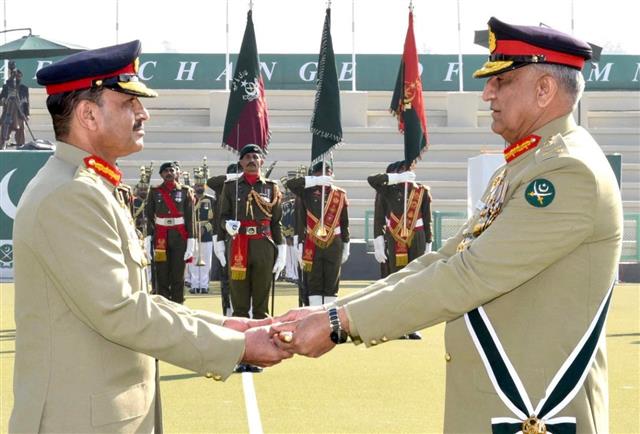Islamabad: General Asim Munir, a former ISI head, assumed charge as the Pakistan Army chief on Tuesday, at a time when the cash-strapped country was in the midst of a political slugfest between the government and opposition leader Imran Khan over holding of snap polls and fresh threats from the dreaded Taliban militants.
General Munir replaced General Qamar Javed Bajwa, who retired after serving two consecutive three-year terms as the Army chief in the coup-prone country, where the military wields considerable power in matters of security and foreign policy.
Munir, who is in his mid-50s, assumed charge at an impressive ceremony at the General Headquarters (GHQ) in Rawalpindi, becoming the 17th Chief of the Army Staff. The ceremony was attended by senior officers, diplomats and politicians.
“I am happy that I am leaving the command of the Army in safe hands,” said 61-year-old General Bajwa who handed over the “baton of command” to his successor.
Gen Bajwa hoped the appointment of Gen Munir as the army chief would prove to be positive for both the country and the army. He quoted a saying from American military leader Douglas MacArthur, which states: “Old soldiers don’t die, they just fade away.”
“I will also into fade into irrelevance but my spiritual relationship with the army will remain,” he said.
Prime Minister Shehbaz Sharif on November 24 nominated senior-most General Munir to the most powerful position in the coup-prone country, where the army has ruled for more than half of its 75-plus years of existence.
He is the first Army chief who has headed both powerful intelligence agencies – the Inter-Services Intelligence (ISI) and the Military Intelligence (MI). His stint as the spy chief at the ISI was the shortest ever as he was replaced by Lt Gen Faiz Hamid within eight months on the insistence of then-Prime Minister Imran Khan in 2019.
His appointment coincides with a dispute between the military and Khan, who blames the army for playing a role in his ouster in April this year through a no-confidence vote.
Khan’s close aide and former information minister Fawad Chaudhry last week said that “until we see the conduct of the new army chief, we cannot say anything about it, but the role of the army in politics in the last 6 months is controversial, this role will need to be changed.” General Munir was commissioned into the Frontier Force Regiment and has been a close aide of Bajwa ever since he commanded troops in the Force Command Northern Areas as a brigadier under him, who was then the Commander X Corps.
Munir was later appointed chief of Military Intelligence in early 2017, and in October next year was made the ISI chief. But he was removed from the position after a short stint as head of the spy agency.
It was said at the time that then-prime minister Khan was not happy with him since he was believed to have brought the alleged corruption of his wife to his notice. Khan was also thought to have been irked by Munir’s resolve to go by the book.
He was then posted as Gujranwala Corps commander, a position he held for two years, before being moved to the GHQ as Quartermaster General. He is the first army chief to be awarded the Sword of Honour.
The new Army chief would have to tackle a host of problems, including the threat from militants. His inauguration comes a day after the Tehreek-e-Taliban Pakistan (TTP) militant group called off an indefinite ceasefire agreed with the government in June and ordered its militants to carry out attacks across the country.
The TTP, also known as the Pakistan Taliban, was set up as an umbrella group of several militant outfits in 2007. Its main aim is to impose its strict brand of Islam across Pakistan.
The group, which is believed to be close to al-Qaeda, has been blamed for several deadly attacks across Pakistan, including an attack on army headquarters in 2009, assaults on military bases and the 2008 bombing of the Marriott Hotel in Islamabad.
The new army chief assumes charge at a time when Pakistan’s reserves with the central bank stands at USD 7.8 billion, barely enough to cover a month’s imports. The cash-strapped country has secured about USD 13 billion in additional financial support from its traditional allies China and Saudi Arabia.
But General Munir’s key test would be how to remain steadfast on the decision by his predecessor that the Army would stay away from politics.
General Bajwa recently said that it was decided in February last year that the Army would not interfere in politics but only play its constitutional role.
Pakistan, a nation of 220 million, has been ruled by four different military rulers and seen three military coups since it was founded. No prime minister has ever completed a full five-year term under the present constitution of 1973.
Meanwhile, Lt Gen Faiz Hamid and Lt Gen Azhar Abbas have opted to seek early retirements, days after they were shortlisted but not appointed to the top positions.
Lt Gen Hamid has sent his resignation to the high command. The authorities have already accepted his resignation, the Dawn newspaper reported.
Geo News also reported his resignation quoting “family sources”.
It also reported that Lt Gen Abbas had also opted for early retirement, quoting his brother. He was working as the Chief of General Staff at the GHQ.
Both officers were set to retire in April 2023.
It is rare that generals, who were not superseded, opted to step down before their scheduled retirement.
Sources said this means the new army chief will have a chance to appoint his men to the crucial positions.


